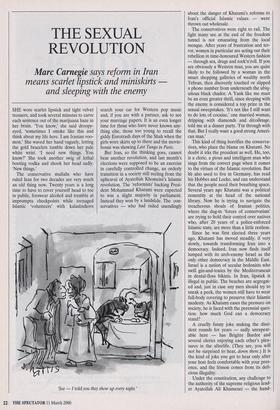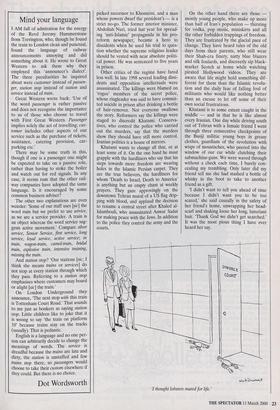THE SEXUAL REVOLUTION
Marc Carnegie says reform in Iran
means scarlet lipstick and miniskirts - and sleeping with the enemy
SHE wore scarlet lipstick and tight velvet trousers, and took several minutes to carve each sentence out of the marijuana haze in her brain. 'You know,' she said droopy- eyed, 'sometimes I smoke like this and think about my life here. I am Iranian voo- mon.' She waved her hand vaguely, letting the gold bracelets tumble down her pale white wrist. 'I need new things. You know?' She took another swig of lethal bootleg vodka and shook her head sadly. `New things.'
The conservative mullahs who have ruled Iran for two decades are very much an old thing now. Twenty years is a long time to have to cover yourself head to toe in public, forswear alcohol and tremble at impromptu checkpoints while teenaged Islamic 'volunteers' with kalashnikovs search your car for Western pop music and, if you are with a partner, ask to see your marriage papers. It is an even longer time for those who have never known any- thing else, those too young to recall the giddy Eurotrash days of the Shah when the girls wore skirts up to there and the movie- house was showing Last Tango in Paris.
But Iran, so the thinking goes, cannot bear another revolution, and last month's elections were supposed to be an exercise in carefully controlled change, an orderly transition in a society still reeling from the upheaval of Ayatollah Khomeini's Islamic revolution. The `reformists' backing Presi- dent Mohammad Khatami were expected to win a slight majority in parliament. Instead they won by a landslide. The con- servatives — who had railed unendingly `See — I told you they show up eve?), night.' about the danger of Khatami's reforms to Iran's official Islamic values — were thrown out wholesale.
The conservatives were right to rail. The light many see at the end of the freedom tunnel is not emanating from the local mosque. After years of frustration and ter- ror, women in particular are acting out their rebellion in time-honoured Western fashion — through sex, drugs and rock'n'roll. If you are obviously a Western man, you are quite likely to be followed by a woman in the smart shopping galleries of wealthy north Tehran, then discreetly touched or slipped a phone number from underneath the ubiq- uitous black chador. A Yank like me must be an even greater thrill, since sleeping with the enemy is considered a top prize in the sexual sweepstakes. 'It's not like I still want to do lots of cocaine,' one married woman, dripping with diamonds and décolletage, told me at a dinner party. 'I'm through with that. But I really want a good strong Ameri- can man.'
This kind of thing horrifies the conserva- tives, who place the blame on Khatami. No doubt it irks the president as well. He, too, is a cleric, a pious and intelligent man who sings from the correct page when it comes to the virtues of the Islamic revolution. But h'e also used to live in Germany, has read his Hobbes and Locke, and can understand that the people need their breathing space. Several years ago Khatami was a political nonentity at the head of the national library. Now he is trying to navigate the treacherous shoals of Iranian politics, where the dug-in `forces of conservatism' are trying to hold their control over natives who, after 20 years of a police-enforced Islamic state, are more than a little restless.
Since he was first elected three years ago, Khatami has moved steadily, if very slowly, towards transforming Iran into a democracy. Indeed, Iran now finds itself lumped with its arch-enemy Israel as the only other democracy in the Middle East. Israel is a nation of secular hedonists who swill gin-and-tonics by the Mediterranean in dental-floss bikinis. In Iran, lipstick is illegal in public. The beaches are segregat- ed and, just in case any men should try to sneak a peek, the women still have to wear full-body covering to preserve their Islamic modesty. As Khatami eases the pressure on society, he is faced with the perennial ques- tion: how much God can a democracy stand?
A cruelly funny joke making the dissi- dent rounds for years — sadly unrepeat- able here — has Brigitte Bardot and several clerics enjoying each other's plea- sures in the afterlife. (They are, you will not be surprised to hear, down there.) It is the kind of joke you get to hear only after your host feels comfortable with your pres- ence, and the frisson comes from its deli- cious illegality.
Under the constitution, any challenge to the authority of the supreme religious lead- er Ayatollah Ali Khamenei — the hand- picked successor to Khomeini, and a man whose powers dwarf the president's — is a strict no-go. The former interior minister, Abdollah Nufi, tried last year for spread- ing 'anti-Islamic' propaganda in his pro- reform newspaper, became a hero to dissidents when he used his trial to ques- tion whether the supreme religious leader should be vested with near absolute politi- cal power. He was sentenced to five years in prison.
Other critics of the regime have fared less well. In late 1998 several leading dissi- dents and opposition intellectuals were assassinated. The killings were blamed on `rogue' members of the secret police, whose ringleader was said to have commit- ted suicide in prison after drinking a bottle of hair-remover. Not everyone swallows the story. Reformers say the killings were staged to discredit Khatami. Conserva- tives, who control the police who carried out the murders, say that the murders show they should have still more control. Iranian politics is a house of mirrors.
Khatami wants to change all that, or at least some of it. On the one hand he must grapple with the hardliners who say that his steps towards more freedom are wearing holes in the Islamic Persian carpet. They are the true believers, the hardliners for whom 'Death to Israel, Death to America' is anything but an empty chant at weekly prayers. They gaze approvingly on the downtown Tehran mural of a US flag drip- ping with blood, and applaud the decision to rename a central street after Khaled al- Islambouli, who assassinated Anwar Sadat for making peace with the Jews. In addition to the police they control the army and the courts. On the other hand there are those mostly young people, who make up more than half of Iran's population — thirsting for vodka, pop music, miniskirts and all the other forbidden trappings of freedom. They are frustrated by the glacial pace of change. They have heard tales of the old days from their parents, who still wear their Shah-era finery, natty blue blazers and silk foulards, and discreetly sip black- market Scotch at home while watching pirated Hollywood videos. They are aware that life might hold something dif- ferent for them than the Islamic revolu- tion and the daily fear of falling foul of militants who would like nothing better than an excuse to let off some of their own social frustrations.
Khatami is to some extent caught in the middle — and in that he is like almost every Iranian. One day while driving south out of Tehran with a female friend I went through three consecutive checkpoints of the Basiji militia: young boys in greasy clothes, guardians of the revolution with wisps of moustaches, who peered into the window of our car while clutching their submachine-guns. We were waved through without a check each time, I barely con- cealing my trembling. Only later did my friend tell me she had stashed a bottle of whisky in the boot to take to another friend as a gift.
didn't want to tell you ahead of time because I didn't want you to be too scared,' she said casually in the safety of her friend's home, unwrapping her head- scarf and shaking loose her long, luxuriant hair. 'Thank God we didn't get searched.' It was the most pious thing I have ever heard her say.
`I thought lobsters mated for life.'



































































 Previous page
Previous page